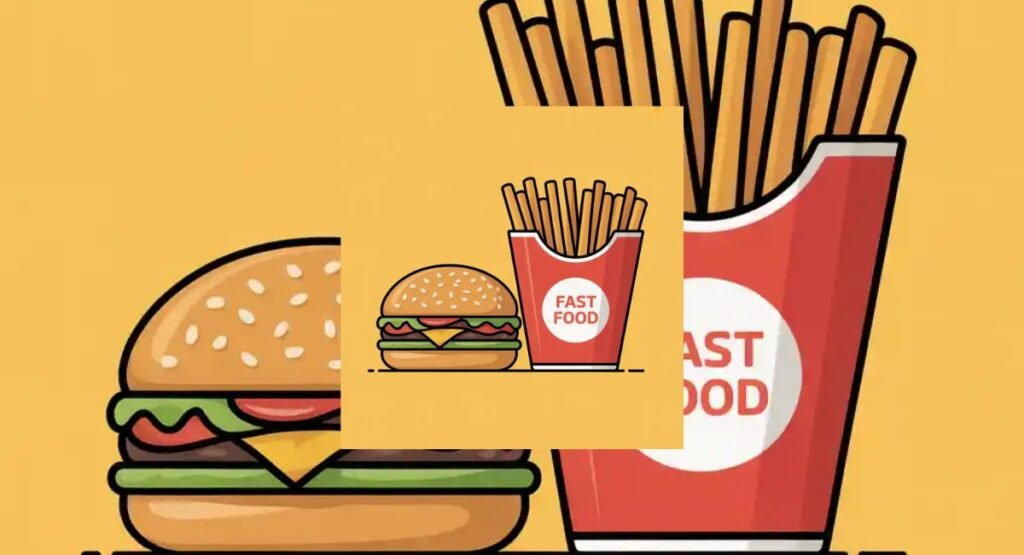Introduction
In today’s busy era, where everything has become fast, the lack of time and the search for convenience in food have made “fast food” a global trend. Pizza, burgers, French fries, cold drinks, and other fast-food items have left a deep impact on our lives.
Although fast food is considered delicious, easy, and time-saving food, the hidden harms behind it are proving to be very dangerous for our health. This article describes in a simple but detailed way the ten major effects of fast food on health that are causing long-term diseases, mental weakness, and social disorders.
What is fast food?

Fast food is food that is prepared in a short time and is available immediately. Usually, this food is prepared and packaged by restaurants, cafes, or food chains. These include:
Burgers
Pizza
Chips
Noodles
Cold drinks
Ice cream
Fried chicken, etc.
These foods are usually prepared with fat, salt, sugar, artificial colors, and preservatives.
The growing trend of fast food
The trend of fast food is not limited to Western countries, but its use is also increasing day by day in Asian countries.
The reasons for this trend are as follows:
Busy life
Lack of time to cook home-cooked meals
Availability at affordable prices
Taste cravings
The preferences of children and youth
Pressure of marketing and advertising
As this trend is growing, health problems are also spreading rapidly.

10 dangerous effects of fast food on health
- Obesity and weight gain
Fast food is very high in calories and fat, especially saturated and trans fats. These fats accumulate in the body, causing weight gain and obesity. Obesity is not only a disease in itself but also the root of many diseases. - Risk of heart disease
Fast food increases blood cholesterol levels, especially “bad” cholesterol (LDL). This results in narrowing of the arteries, which increases the risk of high blood pressure, irregular heartbeat, and heart attack. - Risk of diabetes
The sugar and simple carbohydrates used in fast foods quickly increase blood sugar levels. Continuous consumption reduces insulin sensitivity and can lead to type 2 diabetes. - Digestive system disorders
Fast foods are devoid of fiber, which causes constipation, indigestion, heartburn, and other gastrointestinal problems. In addition, this food also affects the natural balance of the intestines. - Burden on the liver and kidneys
Artificial flavors, colors, and preservatives put pressure on the liver. In addition, excess salt can damage kidney function and increase the risk of stones or kidney failure. - Negative effects on mental health
Research has shown that excessive consumption of fast food can be associated with depression, anxiety, irritability, and low morale. The fats present in them slow down the functioning of brain neurons. - Decreased immunity
The lack of nutrients in fast food affects the immune system. Due to the lack of vitamins, minerals, and essential amino acids in the body, diseases attack quickly. - Weak bones and teeth
The phosphoric acid and sugar in cold drinks and fast food remove calcium from the bones, which increases the risk of osteoporosis (bone weakness). Tooth decay and gum disease are also common. - Skin problems
Excessive consumption of fast food also affects the skin, especially acne, oiliness, wrinkles, and dullness. The oils and spices in these foods quickly damage cells. - Hormonal disorders
Some fast foods contain chemicals that affect the natural production of hormones. This problem can become more serious, especially in teenagers during puberty, such as uncontrolled weight gain, acne on the face, and mood swings.
Effects on children and adolescents
Children and adolescents are the biggest victims of fast food. Advertising and the appeal of taste attract them, which can lead to the following consequences:
Increasing obesity
Decreased learning and concentration
Sluggishness
Avoidance of physical activity
Persistent illness
If parents and teachers do not pay attention to their diet, the long-term consequences can be dangerous.
Social impacts
The popularity of fast foods has created a distance from family meals, traditional dishes, and healthy eating. People have come to consider food only as a means of “filling the stomach,” although food is associated with emotions, traditions, and health.
Alternative solutions
Although it is difficult to completely avoid fast food, its harms can be reduced by taking a few measures:
Do not eat it more than once a week.
Prefer homemade burgers or sandwiches.
Use plain water or fresh juice.
Include vegetables and fruits in your daily diet.
Get your children used to healthy snacks.
Prepare pure and balanced food at home instead of buying it from the market.
Conclusion
Fast food may give you temporary pleasure, but its consequences can be long-term and dangerous. Continuous consumption of this food affects physical, mental, and social health. It is important that we balance our diet, adopt healthy habits, and also inform our future generations about this danger.
Health is a blessing that we can protect ourselves with. If we change our priorities by knowing the harms of fast food, a better life, good health, and a positive society can be formed.



